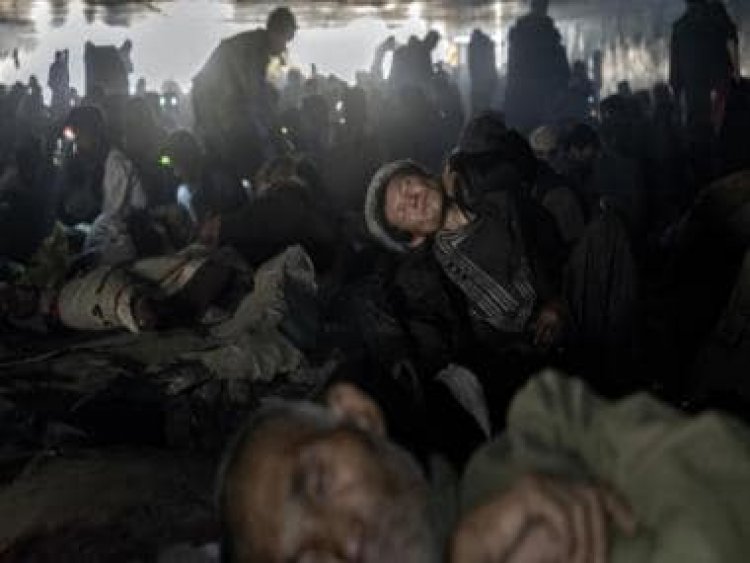Taliban government rounding up addicts in a bid to fight drug menace
Taliban government rounding up addicts in a bid to fight drug menace

Kabul: In an effort to combat drug addiction, the Taliban are rounding up hundreds of Afghan males. The majority have been transported to a temporary rehabilitation facility that was once a US military installation.
In a nation with about 40 million individuals, approximately 3.5 million of them struggle with addiction.
Mohamed Omar, one of the addict talked to BBC about the unannounced arrival of Taliban troops at the Pul-e-Sukhta bridge in western Kabul.
The region was a well-known hangout for drug addicts long before the Taliban took back control in August 2021.
They have been rounding up hundreds of males in recent months from all over the city, including the bridge, parks, and hilltops. The majority have been transported to a temporary rehabilitation facility that was once a US military installation.
Afghanistan is the world’s centre for substance addiction. According to the Bureau of International Narcotics and Law Enforcement, 3.5 million individuals in a nation of about 40 million are reportedly addicted.
Hundreds of men are frequently seen squatting under the Pul-e-Sukhta bridge, hunched over garbage piles, syringes, human waste, and occasionally overdose victims’ bodies.
Methamphetamine or heroin are the preferred narcotics.
Dogs are rummaging through piles of trash beneath the bridge, emitting an offensive odour while searching for food scraps. Overhead, commuters race to catch buses at the nearby depot as traffic flows and street vendors peddle their wares.
“I would go there to meet my friends and take some drugs. I didn’t fear death. Death is in God’s hands anyway,” says Omar.
Despite the previous administration’s strategy of rounding up addicts and housing them in centers, the men who named this place home were largely forgotten. However, when the Taliban regained power in the nation, they began a more aggressive effort to drive them off the streets.
Omar claims that “they used pipes to whip and beat us.” I fought leaving the bridge and as a result, I broke my finger. Still, they ejected us.
Omar and many other people were crammed onto a vehicle.
Later footage made public by the Taliban government showed soldiers removing the corpses of addicts who had overdosed and died, carrying the bodies away while they were still alive. Others who were still alive had to be carried outside on stretchers because they were unresponsive.
Omar was brought to a rehabilitation facility that has 1,000 beds and 3,000 patients right now. The situation is appalling. Before being released, the men spend about 45 days in the facility undergoing a rigorous programme.
The likelihood of these individuals experiencing a relapse is uncertain.
While males make up the majority of those taken off the streets, some women and kids have also been sent to special rehabilitation facilities.
Omar is severely malnourished, his brown outfit supplied by the authorities loosely hanging off of him, and his face gaunt, just like the rest of the addicts in the Kabul treatment facility room.
He talks about his former existence while sitting on the edge of the bed.
“I was in Dubai one day, Turkey the next, and occasionally Iran. As a flight attendant for Kam Air, I travelled the globe and frequently carried distinguished passengers like past presidents.
When Kabul fell, he was fired from his position. He resorted to drugs as a result of financial hardship and an uncertain future.
In the 1990s, the Taliban virtually eradicated the production of poppies. Nevertheless, during their 20-year insurgency, the drug trade turned into one of their main sources of revenue.
The Taliban now claim to have ordered an end to the traffic in opium and are working to put this order into effect. However, the UN reports that compared to 2021, cultivation grew by 32% in 2022.
Afghanistan’s economy, meanwhile, is on the verge of collapse due to a loss of foreign assistance, security issues, climatic problems, and global food inflation.
Omar was brought to a rehabilitation facility that has 1,000 beds and 3,000 patients right now. The situation is appalling. Before being released, the men spend about 45 days in the facility undergoing a rigorous programme.
The likelihood of these individuals experiencing a relapse is uncertain.
While males make up the majority of those taken off the streets, some women and kids have also been sent to special rehabilitation facilities.
Omar is severely malnourished, his brown outfit supplied by the authorities loosely hanging off of him, and his face gaunt, just like the rest of the addicts in the Kabul treatment facility room.
He talks about his former existence while sitting on the edge of the bed.
“I was in Dubai one day, Turkey the next, and occasionally Iran. As a flight attendant for Kam Air, I travelled the globe and frequently carried distinguished passengers like past presidents.
When Kabul fell, he was fired from his position. He resorted to drugs as a result of financial hardship and an uncertain future.
In the 1990s, the Taliban virtually eradicated the production of poppies. Nevertheless, during their 20-year insurgency, the drug trade turned into one of their main sources of revenue.
The Taliban now claim to have ordered an end to the traffic in opium and are working to put this order into effect. However, the UN reports that compared to 2021, cultivation grew by 32% in 2022.
Afghanistan’s economy, meanwhile, is on the verge of collapse due to a loss of foreign assistance, security issues, climatic problems, and global food inflation.
Read all the Latest News, Trending News, Cricket News, Bollywood News,
India News and Entertainment News here. Follow us on Facebook, Twitter and Instagram.
What's Your Reaction?

























































